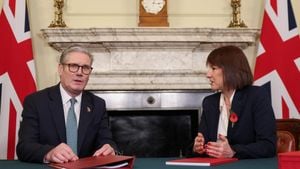Rachel Reeves has made her mark as the first female Chancellor of the Exchequer, and her inaugural budget is poised to send ripples through the United Kingdom’s economic framework. With the slogan "invest, invest, invest" echoing through the chambers of Parliament, Reeves is set to lay out ambitious plans alongside significant tax hikes aimed at pulling the economy out of what she describes as the "black hole" left by previous Conservative administrations.
Standing before the House of Commons on Wednesday, Reeves will outline her strategy to raise £40 billion through various tax increases. Among these changes are anticipated hikes to inheritance tax, capital gains tax, and increased National Insurance contributions from employers, which she argues will be necessary to shore up public services and restore fiscal integrity to the country. Her goal? To restore economic stability and set the stage for growth.
Part of the appeal of Reeves’ budget is the promise of financial support for the National Health Service (NHS), which is expected to receive billions to address crippling waiting lists and modernize facilities. This is just one area where the Labour government aims to demonstrate its commitment to public welfare amid rising living costs.
Income tax thresholds are also on the chopping block with plans to freeze them, effectively moving millions of workers up the tax brackets as their salaries incrementally rise—a situation many are dubbing as "stealth tax." At the same time, Reeves is pledging to increase the minimum wage substantially—an increase of nearly 7%—aiming to alleviate hardships faced by low-income families and bolster household spending.
Reeves encapsulated her vision by stating, "My belief in Britain burns brighter than ever. And the prize on offer today is immense," signaling optimism even as the country grapples with economic uncertainty.
But it’s not all sunny proclamations; the budget is receiving pushback from opposition leaders. Former Prime Minister Rishi Sunak has criticized Reeves for her tax strategies, referring to the National Insurance hike as a "jobs tax"—a move he claims takes money directly out of workers' pockets. This rhetoric highlights the stark division between Labour's investment-focused approach and Conservative caution over tax increases.
The budget is set to redefine the financial architecture of the UK and echoes historical parallels to previous Labour-led government initiatives aimed at economic rejuvenation. Reeves’ comments hark back to the Labour achievements of the mid-20th century, stating, "This is not the first time it has fallen to the Labour Party to rebuild Britain..." This sentiment aligns with her broader narrative of restoration and growth.
Financial analysts are watching closely, as major firms are set to react to these announcements. The FTSE 100 index has already shown signs of apprehension, dipping slightly on the eve of the budget. The outcome of Reeves' first major financial statement could dictate market movements and investment trends for years to come.
Another significant aspect of her plans involves altering the government's self-imposed debt rules, which would enable additional borrowing up to £50 billion—this, according to Reeves, is to fuel investments across public services. Her administration aims to firmly reject the austerity measures of the past, promising more than mere incremental changes.
Despite these plans, critics argue about the sustainability of financing new initiatives through tax hikes and increased borrowing. The mixed public perception surrounding elevated taxes may also pose challenges as the Labour Party seeks to balance investment with fiscal responsibility.
"The extent to which this budget can successfully stimulate economic growth and living standards improvement remains to be seen," analysts say, emphasizing the uncertainty as Brits brace for what could be the most influential budget declaration since the coalition government’s austerity programs.
With only hours to go until the budget speech, the government is responding to diverse pressures. For many, this budget is viewed as the first real test of Reeves' leadership—whether her ambitious vision aligns with the realities faced by everyday Britons. The discussion surrounding tax increases is not new; the backdrop of rising inflation and spiraling living costs has generated heated debate and uncertainty about the future.
Looking beyond national headlines, the impact of Reeves' budget will also resonate on local communities across the UK. With committed spending planned for schools and housing, Labour is attempting to portray itself as integrated with the needs of the populace and dedicated to improving local infrastructure and educational services.
The overarching theme of the budget—investment to bolster growth—could serve as the cornerstone of Labour’s rebuttal to Conservative criticisms of public spending and economic strategy. Labour aims to articulate the narrative of fostering economic opportunity by arguing passionately against the austerity model their opponents stood by for over a decade.
The speech will be closely monitored not only for its immediate content but also for its historical significance. It will be the moment where Rachel Reeves sets her course, potentially shaping the political and economic landscapes for years to come. From tax hikes to welcomed increases in the minimum wage, the ramifications of her plans could define her tenure and Labour's direction going forward.
So, as the nation waits with bated breath, will Rachel Reeves’ first budget deliver on its ambitious promises or will it plunge the UK back to economic uncertainty? The answer lies just hours away, as history watches closely to see what story will emerge from the Treasury’s red box.



